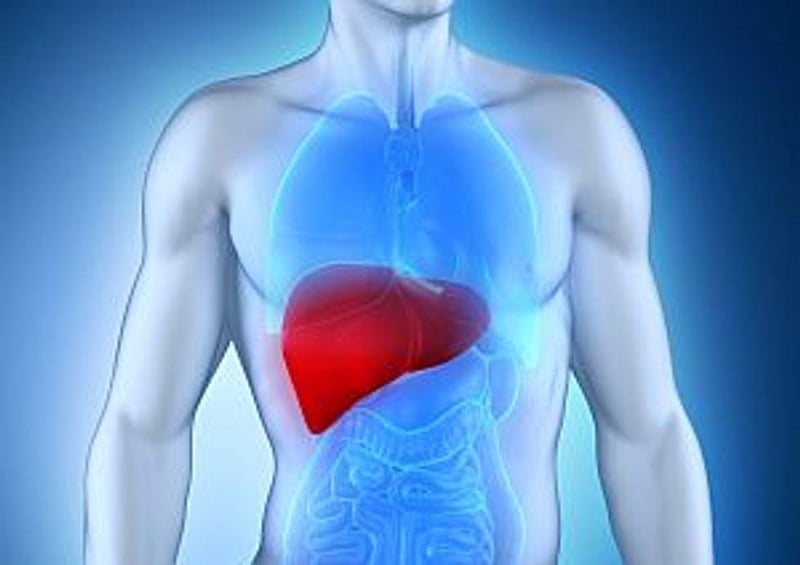Get Healthy!

- Dennis Thompson
- Posted October 22, 2021
Deadly Liver Disease Tied to Obesity Is on the Rise
Liver disease is usually associated with alcoholism or hepatitis, but obesity and diabetes are becoming an even more dire threat for potentially fatal liver damage, a new study reveals.
In fact, advanced fatty liver disease increases a person's risk of death by nearly sevenfold, according to a new report.
But it's a silent killer -- by the time you develop symptoms related to fatty liver damage, you're in deep trouble, warned co-researcher Dr. Jeanne Clark, director of general internal medicine at Johns Hopkins School of Medicine, in Baltimore, Md.
"Once you got this advanced liver disease, which can take years and decades to develop, then people who had that scarring that got so advanced were more likely to die," Clark said.
The condition occurs when excess fat begins to be stored in the liver, causing inflammation and eventually scarring, Clark said.
"It is akin to foie gras or pate, which is caused by overfeeding ducks or geese," Clark said. "They feed them a lot of carbohydrates, grains, pretty quickly. It overruns the metabolic system in the liver, and they put the fat down right in the liver."
About one in four people in the world suffer from fatty liver disease, according to the U.S. National Institutes of Health. An editorial accompanying the new study noted that advanced fatty liver disease has overtaken hepatitis C as the main cause of liver scarring and the main reason for liver transplantation.
In humans, fatty liver disease is tied to metabolic syndrome, said Dr. Scott Friedman, dean for therapeutic discovery and chief of liver disease at the Icahn School of Medicine at Mount Sinai, in New York City.
Metabolic syndrome is a cluster of health problems that have been linked to an increased risk of heart disease, stroke and type 2 diabetes. They include increased blood pressure, high blood sugar, excess belly fat and abnormal cholesterol levels.
"The average person, and even many doctors, don't appreciate there's a growing risk of advanced liver disease among patients who are obese, have type 2 diabetes and have the so-called metabolic syndrome," Friedman said. "Many of them can be harboring silent but progressive liver disease that can be lethal eventually."
For their study, Clark and her colleagues tracked nearly 1,800 people suffering from fatty liver disease for four years, to see how the condition affected their health.
The researchers found that as fat-related scarring progressed in the liver, people were more likely to suffer from liver-related complications like internal bleeding, excess fluid, and mental confusion caused by an accumulation of toxins in the body and brain, Clark said.
As fatty liver disease progresses, patients become more likely to develop type 2 diabetes and impaired kidney function, the study authors said.
People who suffered those sort of liver-related complications were about seven times more likely to die, the researchers found.
These results indicate a need to be on guard when one is obese and has diabetes, Friedman said.
"Both patients and providers need to be aware that, especially in patients with type 2 diabetes and obesity and these features of the metabolic syndrome, that they need to investigate whether there's also underlying liver damage or disease," Friedman said.
However, not everyone with a fatty liver will progress to liver disease, he noted.
"It turns out that most people who have fat will never get inflammation and scarring, but a subset -- probably somewhere around 20% to 30% -- will actually develop scarring," Friedman said. "We don't know why some patients will always have just fat and nothing more, and others will go on to injury, inflammation and scarring."
Weight loss is currently one of the best treatments available for fatty liver disease, Clark and Friedman said.
"There are good data to show if there's fat in the liver, losing weight can make that fat disappear," Clark said.
Unfortunately, the type of weight loss required isn't easy to achieve.
"For most people it's hard to lose a lot of weight and keep it off," Clark said. "You probably need to lose 10% of your body weight and keep it off, and we know that's hard to do."
No medications are currently approved to treat fatty liver disease, but "there is a flurry of interest in the pharmaceutical and biotech industries to develop new drugs," Friedman said.
"There are literally dozens of treatments that are being tested in clinical trials," he said.
In the same Oct. 21 issue of the New England Journal of Medicine, another study reported stage 2 clinical trial results for one such drug.
Liver scarring was halted and even somewhat reversed in about 35% of fatty liver patients given a high dose of the drug, lanifibranor, Pierre Broqua from the University of Antwerp in Belgium, and colleagues reported.
More information
The U.S. National Institutes of Health has more about fatty liver disease.
SOURCES: Jeanne Clark, MD, MPH, director, general internal medicine, Johns Hopkins School of Medicine, Baltimore, Md.; Scott Friedman, MD, dean for therapeutic discovery, chief, liver disease, Icahn School of Medicine at Mount Sinai, New York City; New England Journal of Medicine, Oct. 21, 2021






